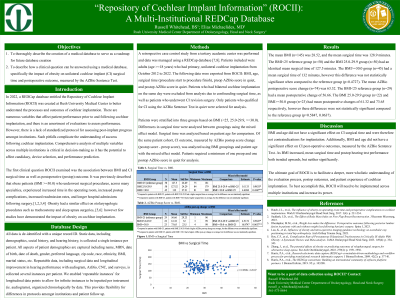Otology/Neurotology
(009) “REPOSITORY of COCHLEAR IMPLANT INFORMATION” (ROCII): A MULTI-INSTITUTIONAL REDCAP DATABASE
Monday, October 2, 2023
2:45 PM - 3:45 PM East Coast USA Time

Has Audio

Russell A. Whitehead, BS
M3
Rush Medical College
Chicago, Illinois, United States- EM
Elias Michaelides, MD
Associate Professor
Rush University Medical Center
Chicago, Illinois, United States
Presenting Author(s)
Senior Author(s)
Disclosure(s):
Russell A. Whitehead, BS: No relevant relationships to disclose.
Introduction: There are numerous variables that affect patient performance prior to and following cochlear implantation, and there is an assortment of evaluations to assess such performance. Etiology of hearing loss, demographics, device parameters, and surgical technique all exert an effect on patient success, yet there is a lack of standardized protocol for assessing post-implant progress amongst institutions. Such pitfalls complicate the understanding of patient success following cochlear implantation. Comprehensive analysis of these multiple variables is critical in decision-making as it has the potential to affect candidacy, device selection, and performance prediction.
Methods: A retrospective, multi-institutional repository in REDCap, named the “Repository of Cochlear Implant Information” (ROCII), was created in November 2022 to collect data on patients who have undergone cochlear implantation in order to analyze the evaluation process, outcomes, and patient experience. Data is exported from the medical record and imported into ROCII. All data is de-identified and associated with a unique record ID. Static data, including demographics, social history, and hearing history, is collected a single instance per patient. Repeatable data, including longitudinal improvement in hearing performance with audiogram, AzBio, CNC, and various survey scores, is collected several instances per patient. All data is organized chronologically.
Results: ROCII is designed for simplistic data entry and allows for multifactorial investigations on a vast combination of data. The repository permits institutions to enter data as their pre and postoperative temporal protocol dictates. This allows for cochlear implant data to be consolidated to a higher power for the analysis of trends across institutions.
Conclusions: ROCII will facilitate a deeper understanding of the evaluation process, outcomes, and patient experience of cochlear implantation across institutions. Looking forward, ROCII aims to guide standardization of cochlear implant evaluation and post-surgical assessment to create the optimal patient outcome.
